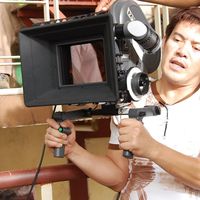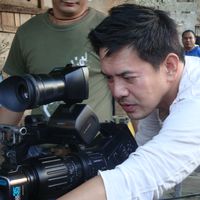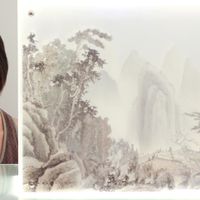In conversation with James Lee
Filmmaker & curator Bernard Chauly speaks to Malaysia's DV maverick as he prepares for the premiere of his up-coming DV feature film, The Beautiful Washing Machine, at the 17th Singapore International Film Festival.
Bernard Chauly (BC): Do you remember the first washing machine you or your family ever owned?
James Lee (JL): Yes, it was my family's, in Ipoh. It was nothing great, not as if it was a 29inch TV! But for my Mum, it was significant. For my Dad and us guys, it was no big deal.
BC: How did the idea for 'The Beautiful Washing Machine ' come about?
JL: There was a period last year when I had no work and had to stay at home a lot. I was sharing the domestic workload with my wife. This was before I directed the Maxis infomercials so I was jobless and stayed at home a lot, caring for my daughter, doing all the shit housework. It was only then that I started learning how to operate a washing machine! Imagine, I knew how to operate computers but not a washing machine. It's not difficult to learn how to use but it's even more useful than a computer. No need to wash underwear, now I can understand how it helps women. During that period, all that staring at the washing machine, that's where the image and idea for 'Washing Machine' came from.
BC: The way you work is to then write a detailed treatment. How did the story develop, from an image of the washing machine to the story of a woman that emerges from a second hand washing machine?
JL: I rewrote a few stories. The first was based on a real woman who lives alone and works in an office. But she loves to be naked when washing clothes. The problem starts when her sister from out of town and her sister's boyfriend come to live with the woman. She continues washing clothes naked. The sister's boyfriend is taken aback at first. But she's son yeh (fit stuff) and he starts shagging both sisters. But when younger sister starts working and can afford to buy a washing machine, the elder sister doesn't need to hand wash clothes anymore. OK, she uses the washing machine but continues to be naked when she uses it.
BC: All that's based on a true story?
JL: Well, about 50% based on fact but if I did that story, people would think that James Lee's directing soft porn, footage to jerk off with. Maybe when I'm famous I can get away with it. But the treatment I ended up with is more Asian, Malaysian.
BC: Yet apart from seeing Maybank ATMs in some scenes, the beautiful thing about the film is it could take place anywhere.
JL: It's Asian in terms of the value of a woman. A thing like the washing machine's supposed to help women but the gender separation remains. They're 'man-made' machines for women. That's still the mindset of power and control.
BC: But that's not specifically Asian. US commercials from the 50s and 60s for instance were all about housewives direct selling washing machines, household items.
JL: Commercials today are still like that, although the psychology may be different. The recent Bosch commercials for instance. A woman in the kitchen breaks something out of rage and screams. Then the husband comes in, she's furious and says that she wants to buy something. Then the tagline and product comes in. Subjugation becomes a different power game. Even my wife thinks, "Wow, is that the way to sell household products?" But it's dark and funny.
BC: What about the 'Toh Toh Tomato Sauce' commercial that's in the film? Did you want to take a piss at TV commercials?
JL: It's purposely crappy, that's why James Lee cannot direct commercials! It's purposely artificial and has a corny feeling, more to the 50's-60's commercials like you mentioned, or 70's, 80's commercials that are direct, which I prefer because they're less manipulative. These days, commercials don't really tell the products, like my Maxis infomercials. Which I feel is worse, using people, personalities to manipulate. Things used to be simplistic before, based on leng loi (pretty girls) telling you "dua sudu boleh cuci putih" (2 spoonfuls will whiten). Now, it's based on personality but the psychology's much more dangerous and manipulative. That's why I deliberately used the direct sell approach for the 'Toh Toh' commercial in the film which doesn't manipulate and is funnier. Now, nobody buys that shit. Those days, our parents bought it.
BC: This time, your film has F&N as a sponsor. It's also the first time you have product placement in your independent films.
JL: Lornalah (Lorna Tee, producer). But they haven't paid. I have no problem with a company giving me money to make a film. It's better than dealing with the mafia for funding. I'm not like Joe Kidd (Malaysian underground music icon), I'm not so radical, I have no problem with brand sponsoring.
BC: The TV clips that appear in the film are very significant. You pre-shot all the material?
JL: Yes.
BC: All except the gay porn?
JL: Yes, that's the only clip that's pirated, it's from real gay porn.
BC: Why does Mr Wong (Patrick Teoh) wear a mask when he watches the porn?
JL: It's just my fetish as a director. For me, it's about an old widower becoming like a kid again. With memory loss, being lonely, depressed, I want the mask to exaggerate the idea of regressing back to childhood. Like a kid who puts on a mask if he's shy, Patrick Teoh's character watches gay porn wearing a mask.
BC: If the idea of fetish is to give lifelike qualities to inanimate objects, is the film fetishising the washing machine? The fact that out of it comes a woman who becomes a slave to two men?
JL: Not fetish in that sense but an obsession with the washing machine and boredom. Again, that period last year when I was at home a lot. Every day, the machine keeps calling you. Beep, beep whenever a load is done. The first cut of the film had a lot more of that sort of human-machine stuff but it was two and a half hours long and much of it had to be cut out. It was harder to watch but it had more interaction between the young guy, Teoh (Loh Bok Lai) and the washing machine. There was lots of staring at the washing machine.
BC: In all your films, your characters smoke and they gaze at things for a long time. I know you don't smoke but do you have a habit of staring at things? A way of observing details that makes it into your films?
JL: Yes, my characters smoke a lot. For me, sometimes after coffee or food, I like people watching. And sometimes at meals, people just look down and don't talk.
BC: Yes, those sorts of uncomfortable silences, protracted gazes are consistent in all your films. Perhaps that's the more 'Asian' quality in your films?
JL: I suppose that's true, instead of a lot of American films where there's a constant need to talk. Maybe it's not Asian, just me. Even sometimes when I have dinner with my in-laws; they eat, I don't talk, occasionally we smile.
BC: In all your script revisions, how did the central female character develop?
JL: My idea for the woman didn't change much. One day she appears from the washing machine. She vacuums, starts doing housework and doesn't speak much. Women should be like that. That's not coming from me, but what's in the film. Teoh has just broken off and I wanted to suggest that his ex-girlfriend looks like the washing machine girl. Everything that he makes her do -- become his slave -- is a way of him getting back at her. Although it may seem that all this is in his imagination, yet it's seen by other people in the film. In reality, to find a woman like that who's silent and just obeys is impossible.
BC: Yet you are portraying that impossibility on screen?
JL: Yes, it may seem illogical. I'm not sure why but I think it'll be fun to see how audiences react. She could be an alien, a ghost, an illegal worker. Illogical as it may be, her existence is justified with the last scene. If it's all in the mind of the two men in the film, maybe there is a girl like that. Maybe not as Mr. Wong (Patrick Teoh) expected but maybe she is a reincarnation of somebody else. Maybe she reincarnated into an Ah Lian!
BC: In Snipers, Ah Beng Returns, Room To Let , you were a one-man-machine; director, DOP and editor all in one. In Washing Machine , you worked with a DOP and an editor for the first time. What was the process like for you?
JL: Having a DOP and an editor is damn good, it makes me finally feel like a director! But in terms of responsibilty, it's just as much. In fact, I was even more kan cheong (anxious) this time because when you are alone, you know what to expect. I know I cannot be confined to myself and I've realised that working with people is more organic than if I do it on my own. I learnt a lot from Teoh (Gay Hian, DOP). How to shoot, compose and light, how to achieve a lot using minimal light. Because of the time factor - we shot the film in 10 days - and not enough grip equipment, he preferred to light a scene fast and shoot. Yet you can achieve something aesthetically wonderful with minimal lighting because of dv. So I learnt a lot. I don't know how to light, that's why I used to shoot without lights! With Room To Let , I could have shot using lots of lights but my actors would have sat around waiting for me to figure it out. It becomes a waste of time. I think it's absurd that of all the arts - film, theatre, dance, art, photography - film is the one that wastes the most time and resources. Just to create fiction, entertainment. I hate to think that if I spend my whole life making films, more than half that time would be wasted waiting for things like lighting. I don't need that much time and resources. With my films, I try to be economical, as han (thrifty) as possible with time, lights, all those things. I still have a long way to making a one million dollar film but even if I get a million, I will split it up and make a few films. It's absurd to make a James Lee film with 1 million. If I did, you won't be my friend. 5K for Ah Beng is OK, not a million. My actors all enjoy it, it's not a waste of anyone's time or money. Anyway, Teoh and I found a good working method.
BC: What about with Grace (Tan) as the editor?
JL: I was also lucky that Grace can work fast. Doing a lot of TV, MTVs, infomercials, she was surprised that you can cut a film with long takes and with no close-ups. Halfway, she learnt the power of long takes, to hold a shot after the action is over. Now she sees why. I asked her, "don't you think it's funny when I hold a shot? The shopping for chicken scene was even longer, extremely long. Patrick just looks and looks. For me, it's a scene to establish what's going to happen between Patrick and Bok Lai. The way even the butcher looks at the chickens is an observation from when I went for the recce. There was a Malay guy just standing there in a very em lei (not bothered) way. I was discussing with Gan (1 st AD) just three feet away. We're talking but he's just standing there with the arms at the back. That why the butcher's like that in the film. It's based on what happened, just more stylised. Sometimes I wish all sales assistants would just stand like that because I hate the "may I help you?"
BC: After watching Room To Let , Yasmin Ahmad commented that it'd be interesting to see James Lee direct someone else's script. Is that something you would consider doing?
JL: Do you have one for me? The problem in Malaysia is that there are no dedicated scriptwriters. We don't have the luxury of having scripts to choose from. I did liase with some people but it turned cold. Rather than writer coming to directors, it's the other way around. I have to chase them, force them to write. I would love to direct another person's script. There was one, a complete stranger who called me after he heard me talking about independent film on TV. He said "would you like to have a look at my script?" But from the few discussions, I knew he had quite fixed ideas about his script and I knew I wouldn't have the freedom to change a lot. I would like very, very much to cross mediums. I am writing a play for theatre which someone else will direct. I would like to direct a film written by someone else.
BC: In all your 4 films, there are some similarities in the choice of your locations, the sorts of worlds of characters that you like.
JL: It's more towards a location, then an activity. I usually see a space, then the activity builds around it. The sense of space is crucial, it influences the look of the film. With Room To Let , I happened to bump into the house, then the idea for the film came. In Washing Machine , the house and apartment are the main locations. The office, street and Supermarket are secondary. I usually think, what will my character do at the Supermarket? It could have been a 7-11 or any kedai runcit (grocery shop) but having a big supermarket makes it sad. There's no point if you can buy whatever you want but still feel sad and lonely, which is what all the supermarket scenes are about. I was very influenced by Punch Drunk Love , the lifeless nature of the character in that film.
BC: The only extras being your crew members helps to enhance that sparseness and sense of isolation.
JL: I purposely did that. I wanted it to be quiet, it may seem absurd not to have any people in the supermarket or on the street but suddenly it looks so real. Even the Alexis scene where the brother and sister meet is silent too. It's more an aesthetic reason, like in theatre. Like 7-10, Chance Encounter , it's through sound and imagination that that you evoke the sense of a place; suggesting what it looks or feels like is more effective. I like that. Even Teoh, after a while felt the same way and said we should try to avoid putting any unnecessary people in the film.
BC: Even more than in your other films, there is minimal dialogue for the most part, which enhances the stylised quality of your storytelling. But when there is dialogue, it suddenly becomes very naturalistic, as if there are two styles.
JL: It was an aesthetic reason but there were some problems with that choice. The first half of the film is stylised but I also wanted the second part to be more TVB (Hong Kong TV station renowned for its serials) drama. The difference becomes quite obvious, like they are two separate short films. I was initially worried if I could sustain the 1 st half because of the lack of dialogue but the 2 nd half turned out to be the problem. In the script, the 1 st half looked like the problem but when we cut the film, then I realised that the family's story is the problem. The story about the lonely guy and the washing machine works.
BC: Maybe because the first part is truer to your James Lee style?
JL: Yes, but I don't want to stick to one style which was why I wanted to try something new as well.
BC: How did the decision to have the 2 stories come about?
JL: It's more the idea of how two different men deal with the same woman. An old man and a young man. If the young guy doesn't get killed, I imagine he'd grow up to be like the older guy. Lonely, abusive. I want to present that idea of contrast. The young man to old man cycle linked by the recycled washing machine. The clothes she wears hints at that. She appears at the young guy's place wearing the older guy's ex-wife's clothes but she goes back with the older guy wearing the dress Teoh bought her. It's weird experimentation of time.
BC: Tomato sauce question. Which directors or films influenced you while making "Washing Machine"?
JL: Like I mentioned, Punch Drunk Love , especially the idea of rewards the central character gets from buying a certain product. I cannot deny Tsai Ming Liang's influence in all my films. It's still quite obvious in this. The more Teoh and I talked, the more we realised it was becoming a Tsai Ming Liang film. That's why with the family story, something had to be different. We also tried to see how we could be different in terms of camera movement. Also influence from some Japanese directors like Kitano.
BC: Violence is still present in this film but it's moved from gangsterism in Snipers to domestic and gender violence in Washing Machine .
JL: As I grow, I find it more interesting to try new things so that I will be better when I go back to my old passions. Initially, all my films were gangster films. When I have completed this journey, then I hope to make a more refreshing gangster film. It will be very different, maybe damn boring as a gangster film but I'm avoiding genre at the moment. I may do horror, sci-fi later but for now, I find gender violence, family drama actually very challenging. Also, for budget reasons, everything's quite communal, small, compact. But it's still challenging, more than directing stunts.
BC: How did you work with your actors, especially Amy Len? Did she have a problem with the gender politics, playing a very subservient woman?
JL: We rehearsed and explored the portrayal a lot. Amy had no problem with the subservience. Maybe, she even likes it. But she loves experimental stuff. When we rehearsed and improvised with actors, she did it with dialogue. Because she's not an actor but a dancer, she gained confidence by talking and verbalising her thoughts while the other actors just reacted. The rehearsal process was like verbal purging for her because she then becomes mute in the film. We didn't deal with her being mute when we were rehearsing. Because we did the opposite in rehearsal, halfway through the shoot, Patrick Teoh said to me; "It's very weird, she talked so much in rehearsal. Now it feels so weird doing the scene with her mute". I told him, "Good, feel that weirdness."
BC: How did Amy feel about doing the rape scene?
JL: It's not rape. Rape is when she's not enjoying it, isn't it? Some have called it soft rape, I call it the make love scene. When she read the script and was OK with it, that was a big problem solved. But because she's not an actress, it proved to be challenging. We shot it twice. I wasn't happy with the first time so we shot it again at the end of the shoot. After both times, now I know better. I was too nice! Maybe I should have worked them harder. The rehearsal was way better but I couldn't get that back. We shouldn't have rehearsed that scene so much. It got to the point that the director has to show and tell. I never believed in doing that before. I was taught by Joe Hasham that a director never shows the actor what to do but sometimes even Joe does. But in some instances, it's necessary. Sometimes, actors are good imitators. Before, I used to show a lot, tell my actors how to be gansgters. Now, I show very little.
BC: Your wife is also the Executive Producer of the film. What does she think of it?
JL: She just says it's OK. She still prefers Ah Beng . Before, she used to say, make more commercial films. Although she liked Ah Beng Returns , she still said "how to make money with a film like this?" When she said Washing Machine is just normal, really chah toh (low blow). So degrading, saying it's just ordinary, but it's her honest opinion as an audience member. With other audiences, I will have to wait and see. Maybe if I had let her act, she would have said it's a great film.
BC: The Beautiful Washing Machine will premier at the Singapore International Film Festival?
JL: Yes, Singapore and Hong Kong in April.
BC: Any European premier yet?
JL: I'd like to make it to Rotterdam again but that's not till next year. In the mean time, I'm targeting German, Italian and French festivals.
BC: Malaysian premier?
JL: Hopefully a GSC (Golden Screen Cinema) screening. I'm targeting the big screen this time. Digital cinema has to be pushed to a new level. GSC is willing to support. It'd be great to screen it and see how people react. We have to show people that there's a future in independent digital cinema. We cannot just have small Actors Studio screenings for the next 50 years.
BC: What next for you?
JL: We just finished shooting Ho Yuhang's Sanctuary which I produced. It's powerful in a different way. We're rushing it for Cannes Directors fortnight. I'm also trying to produce two other independent features for 2 different directors as well as writing the script for next feature and a play.
BC: Earlier in the year, you said to me, 2004, 4 is sei (death), you don't know if this year will be a good year. Well, this year's 2004 and you've just finished your 4 th feature film.
JL: I'm not superstitious anymore. I'm not wealthy, I'm broke. I think you can only believe in that stuff when you're shit rich. Having gold fish, feeding flower horn fish, believing in feng shui, all that needs money. So I'm not superstitious anymore. If I had big budgets, I would pay for the sun to shine during shoot, have pre-shoot rituals. Which is common practice in places like Hong Kong. Pray before you roll.
BC: Who does the laundry at home at the moment?
JL: Either my wife or me. Who free, who do.
Bernard Chauly is a Malaysian filmmaker, lecturer, curator.
Similar content
By Kerrine Goh
12 Feb 2012
By Kerrine Goh
22 Sep 2009
By Kerrine Goh
03 Apr 2005
By Kerrine Goh
30 Nov 2011




